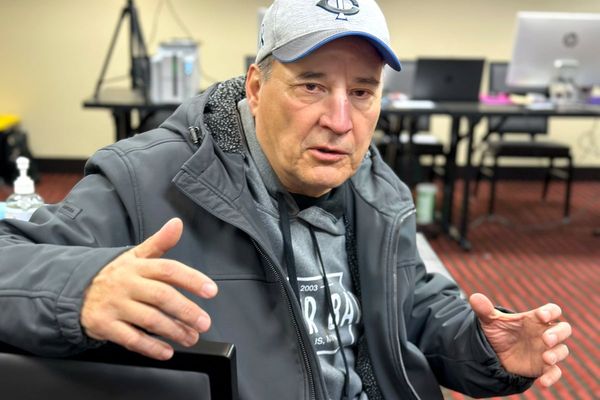The Solomon Islands government has ordered the country's national broadcaster to self-censor its news and other paid programs and only allow content that portrays the nation's government in a positive light.
Staff at Solomon Islands Broadcasting Corporation (SIBC) confirmed to the ABC that acting chairman of the board William Parairato met with them last Friday to outline the new requirements.
They include vetting news and talkback shows to ensure they did not create disunity.
Mr Parairato had earlier attended a meeting with the Prime Minister's office, the SIBC journalists said.
Prime Minister Manasseh Sogavare has become increasingly critical of the public broadcaster, accusing SIBC of publishing stories that have not been verified or balanced with government responses.
Last month, SIBC was removed as a state-owned enterprise (SOE) and became fully funded by the government, raising concerns over the broadcaster's independence.
The government defended the reclassification, saying it had a duty to protect its citizens from "lies and misinformation".
It is unclear whether SIBC — which plays a vital role as a government watchdog — will be able to publish any news or statements from the opposition under the new regime.
Critics are concerned the new rules resemble media policies adopted by the Chinese Communist Party, and could essentially make SIBC a mouthpiece for the government.
Media Association of Solomon Islands president Georgina Kekea said there were growing fears the government would be influenced by its "new partner", referring to the security pact recently signed between Solomon Islands and China.
"It really doesn't come as a surprise," she told the ABC.
"This is one of the things which we are fearful of for the past month or so now.
"We've been vocal on this issue, especially when it comes to freedom of the press and media doing its expected role."
What impact will it have?
Honiara-based Melanesian News Network editor Dorothy Wickham said it was unclear how the development would play out.
"We haven't seen this happen before," she said.
"If the opposition gets on SIBC and starts criticising government policies, which every opposition does ... would the government disallow SIBC to air that story or that interview? That is the question that we're asking."
Officials have denied taking full control of SIBC's editorial policy, saying it just wants the broadcaster to be more responsible because it's a government entity.
But University of South Pacific journalism professor Shailendra Singh said the government's intentions were clear.
"There seems to be no doubt that the government is determined to take control of the national broadcaster, editorially and financially," he told ABC's The World Today.
"I don't think there's any way the government can be stopped.
"This latest move by the government, what it has done with the SIBC, is bring it closer to media in a communist system than in a democracy."
Press freedoms dwindling
Local media have been vocal about increased government secrecy, the closing of doors and controlled dissemination of information from the prime minister's office.
Wickham said the media did not have issues with governments in the past, adding that since the security pact was signed with China, the government had been making life harder for the press.
"I don't think this government actually restricts us, I think it's controlling their information more than they used to," Wickham told ABC's The World.
"The government has been concerned that the negativity expressed by a lot of Solomon Islanders is affecting how the government is trying to roll out its policies."
When China's foreign minister toured the country in May, Solomon Islands local media boycotted a press conference because they were collectively only allowed to ask one question — to their own Foreign Minister.
They also struggled to get information about the timing of the visit and agreements being signed between the two countries.
Last month, the ABC was also shunned after being promised an interview with Mr Sogavare after his national independence day speech, in which he thanked China for being a "worthy partner" in the country's development.
Instead, his minders escorted him to a nearby vehicle, with police blocking reporters from getting close to the Prime Minister.
Professor Singh warned that the country's democracy would suffer as a result of less media freedom.
"Media is the last line of defence, so if the media are captured, who will sound the alarm? It's happening right before our eyes. It's a major, major concern," he said.
'A wake up call'
Kekea said SIBC staff should be able to do their job freely without fear and intimidation.
But the best thing the media can do is uphold the principles of journalism, stressing that "we must do our jobs properly".
"It's a wake-up call for SIBC to really look at how they have gone over the years, how they format their programs, the quality control they have in place," Kekea said.
"It's really a wake up call for every one of us."
She said the media landscape had changed over the years and standards had been dropping, but the government also needs to respect the role of journalist and be more open to requests for information.
The Prime Minister had repeatedly said he was available for questions and calls, but local media complained they were continuously left unanswered, she said.
"They do not have the courtesy to respond to our emails. Even if we want to have an exclusive it gets rejected," Kekea said.
"So it's time governments should also walk the talk when it comes to responding to the media when they ask questions."
The ABC has contacted Solomon Islands' Prime Minister's office and SIBC for comment.







